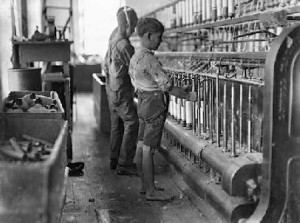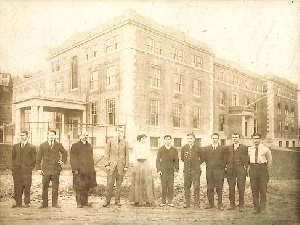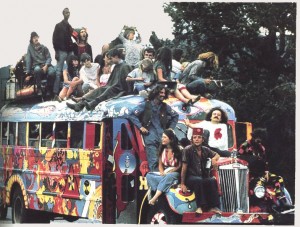 A person’s happiness and satisfaction in life is a function of how he perceives work. People perceive their work in three general categories: jobs, careers, and vocation. People who perceive their work as a Vocation report the highest Satisfaction with Life in general.
A person’s happiness and satisfaction in life is a function of how he perceives work. People perceive their work in three general categories: jobs, careers, and vocation. People who perceive their work as a Vocation report the highest Satisfaction with Life in general.
A job is just a means of earning an income. When people have a job they look forward to breaks, quitting time, the weekend, holidays, and vacation. Outside of working hours, little or no thought, time, or energy is devoted to the work.
The word “vocation” comes from the Latin vocare, or voice – meaning to follow the voice of God, or to do what we are called to do. Young children know their calling but the System of Education and often their Parents make it very difficult for them to follow their Heart. The main reason is that schools and many parents limit the vision of the child to a specific Career.
The word “career‘ has its origins in the Latin word for a Race-Track. A career is a race and the sad thing is that in a race only one person wins and many lose. People become highly frustrated and demotivated when they realize that they will not win the career. When this happens their work changes into a job or they start to look for their real vocation.
The most important difference between a Vocation and a Job is Direct Feedback. When you are a Nurse the positive response of the patient is the reward you are looking for. When you are an Artist or a Craftsman the enthusiasm of your customers for your product is a stimulus to move on. It is not strange that people who are experiencing their work as a job spend a lot of time in contexts (e.g. a soccer-club) where direct feedback is happening.
During the Industrial Revolution work became dehumanized and compartmentalized. Every worker controlled a small part of the production chain and/or was totally controlled by the production chain. The Feedback between the Result of the Work and Work is almost completely disappeared. Humans need Feed-Back. This is the main reason why the Employees in a Burocratic Factory Organization consider the Manager of their Career, their Boss, as their most important Customer.
When you want to understand Your real Vocation You could visit a Vocational Psychologist.
The creation of Vocational Psychology is linked to the emergence of the large commercial cities in which the factory system changed the keystone of the economy from agriculture to manufacturing. The factories needed specialized workers to operate and maintain the machines. The factories were managed by the principles of Scientific Management developed by Frederick Winslow Taylor. Scientific Management, the extreme drive to work Efficiently, is still the driving force behind the Automation of Work.

During the Industrial Revolution many young man left the countryside and went to the big cities to find a job. They worked 10 to 12 hours a day, six days a week. Far from home and family, they lived and slept at the workplace. Outside the shop open sewers, pickpockets, thugs, beggars, drunks, lovers for hire and abandoned children created a non-secure environment.
 The Young Men’s Christian Association (YMCA) was founded in London, England, on June 6, 1844.
The Young Men’s Christian Association (YMCA) was founded in London, England, on June 6, 1844.
The YMCA created Dormitories, Gyms, Swimming pools, Bowling Alleys, Meeting Halls, Employment Bureaus, Libraries, Psychological Tests, Training Courses and Vocational Guidance Programs for the workers in the factories.
One of the important products of the YMCA was the Find Yourself Program that was transformed into a book by C.C. Robinson in 1912.
General Electric, the major manufacturer of light bulbs, had preliminary evidence that better lighting of the work place improved worker productivity. In 1924 AT&T’s Western Electric Hawthorne plant located in Cicero, Illinois, was chosen as the laboratory. The scientists detected that work was not only a physiological activity. The huge interest of the management in the workers of the Hawthorne Plant simply increased their productivity. This was a break with the Scientific Management School that saw work productivity as “mechanical”, and led to the decision to learn more about the psychology and the personality of the worker.
John Holland began his career as classification interviewer for the Army. In 1959 he published his Theory of Vocational Choice, in which he first described Six Types of Vocational Personalities. In 1969, he and his colleagues at the American College Testing Program discovered that the Six Types fit a circular ordering of correlations called the Holland Hexagon. John Holland discovered that work is an Expression of the Personality.
Realistic people like well-ordered activities, or enjoy working with objects, tools, and machines.
Investigative people like activities that involve creative investigation of the world or nature.
Artistic people like unstructured activities, and enjoy using materials to create art.
Social people enjoy informing, training, developing, curing and enlightening others.
Enterprising people enjoy reaching organizational goals or achieving economic gain.
Conventional people enjoy manipulating data, record keeping, filing, reproducing materials, and organizing written or numerical data.
There is a strong relationship between the Holland Codes and other “circular” personality theories like the Enneagram, Myers-Briggs, The Big Five and the Worldviews of Will McWhinny. Statistical research shows that the spread between the different personality types is almost constant. Personality Types are also inherited from the parents.
Since the development of the Holland Hexagon in the seventies the statistics show a high stability in the nature of occupations. The often discussed dramatic shift in the nature of work is not apparent in these data. Although employment in the Investigative area, the Researchers, doubled over a period of 40 year it remained only 6% of employment. The Realistic Work Type, the Craftsman, has still the most occupational titles and the largest number of individuals employed. The Artistic Work Type (the Creators, 2%) has the fewest occupational titles and the fewest number employed.
What is Happening?
Work is an Expression of the Personality and the Personality is an Expression of the Work a person is Performing.
Personality Types and Work Types are distributed according to an almost constant distribution.
Personality Types and Work Types are inherited from the Parents.
The distribution is Not Without Any Sense.
There are Many Workers (Sheep) and just a few Shepherds needed.
Somebody has to Take Care of the Shepherds and the Sheep.
Somebody has to Keep the Books.
The Mythics, The Creators, The Artists, the Goats, Shape the Future but it takes a long time before the Sheep and the Shepherds follow the Creators.
The Creators (2%) are extremely Obstinate and Willfull. They want to take Care of Themselves, don’t accept any Leader or Helper, don’t care about Bookkeeping and Money and don’t want to Collaborate. They just want to find out Everything by Themselves.
The Creators are always remembered when they are dead.
That’s Life.
LINKS
The History of Vocational Psychology, Mark Savickas, David Bakerf
A Short Introduction in Vocational Psychology
About The Statistics of Myers Briggs
A Holland perspective on the U.S. workforce from 1960 to 2000
A Holland Perspective on the U.S. Workforce from 1960 to 1990
A Beautiful Visualization of the Changes in the Workforce between 1890 and Now



